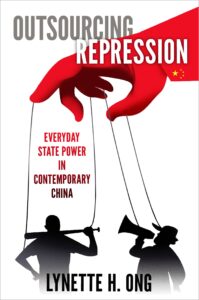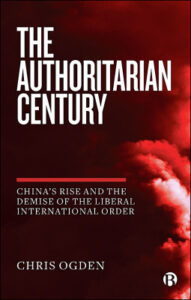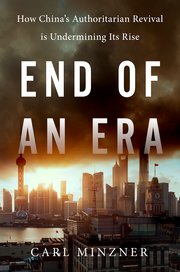Taxpayer money is being used to ‘smuggle Chinese ideology’ into Australia via community language schools, reports suggest. Students are using textbooks from the CCP’s United Front which say the South China belongs to China and gloss over the country’s troubled relationship with Taiwan and Tibet, Sky News Australia reports.
Two experts on China’s foreign influence operations explain how Beijing targets Chinese Canadians (above).
 Domestically, Xi Jinping is on the political march again. After a turbulent year that ended in faltering growth, widespread protests, and a surge of deaths after China abruptly abandoned Covid controls, China’s top leader is poised to secure even more power at the annual gathering of the national legislature that opened last week, adds The New York Times:
Domestically, Xi Jinping is on the political march again. After a turbulent year that ended in faltering growth, widespread protests, and a surge of deaths after China abruptly abandoned Covid controls, China’s top leader is poised to secure even more power at the annual gathering of the national legislature that opened last week, adds The New York Times:
The question hanging over China is whether Mr. Xi can instill economic confidence, especially among private investors, while continuing to expand the Communist Party’s control over the country, as he has signaled he will do.
“He has not fundamentally given up on his original goals; it’s a temporary tactical retreat,” said Claremont McKenna College professor Minxin Pei. “But in order to get the economy truly back on track, he needs to convince the skeptics that he’s now for real.”
The U.S. has never had a potential adversary like China, according to U.S. Sen. Mark Warner (Dem-Va.).
 “If China moves forward to support Russia in Ukraine, I can’t understand some of my colleagues who are willing to say, ‘I don’t really care about Ukraine, but I’m concerned about China.’ Well, China and Russia, these authoritarian regimes, are linked, and we have to make sure Putin is not successful in Ukraine and that Xi doesn’t further his expansion plans around Taiwan,” he told FOX News Sunday.
“If China moves forward to support Russia in Ukraine, I can’t understand some of my colleagues who are willing to say, ‘I don’t really care about Ukraine, but I’m concerned about China.’ Well, China and Russia, these authoritarian regimes, are linked, and we have to make sure Putin is not successful in Ukraine and that Xi doesn’t further his expansion plans around Taiwan,” he told FOX News Sunday.
Chinese Premier Li Keqiang is taking his final bow in a departure that marks a shift from the technocrats who have helped steer the world’s second-biggest economy in favor of officials with unquestioned loyalty to President Xi Jinping, The Associated Press reports:
After graduation, Li went to work at the Communist Youth League, an organization that grooms university students for party roles, then headed by future president and party leader Hu Jintao. Higher office soon followed….Among the largely faceless ranks of Chinese bureaucrats, Li managed to show an unusually candid streak. In a U.S. State Department cable released by WikiLeaks, Li is quoted telling diplomats that Chinese economic growth statistics were ‘‘man-made,’’ and saying he looked instead to electricity demand, rail cargo traffic, and lending as more accurate indicators.
Li may be remembered less for what he achieved than for the fact that he was the last of the technocrats to serve at the top of the Chinese Communist Party, said Carl Minzner, an expert on Chinese law and governance at New York’s Fordham University and the Council on Foreign Relations.
 Politically, Xi’s authoritarian tendencies risk a return to Mao-era practices where elite politics become “yet more byzantine, vicious, and unstable,” Minzner told POLITICO. Li’s departure “marks the end of an era in which expertise and performance, rather than political loyalty to Xi himself, was the primary career criterion for ambitious officials seeking to rise up to higher office,” he said.
Politically, Xi’s authoritarian tendencies risk a return to Mao-era practices where elite politics become “yet more byzantine, vicious, and unstable,” Minzner told POLITICO. Li’s departure “marks the end of an era in which expertise and performance, rather than political loyalty to Xi himself, was the primary career criterion for ambitious officials seeking to rise up to higher office,” he said.
But Li never mentioned political reforms. During a recent visit to the National Development and Reform Commission, China’s top economic planner, Li appeared to give a farewell speech to the officials greeting him, saying China’s economic reform still needed to be “comprehensively promoted”.
“China’s economy is slowing considerably,” notes one expert. “There is actually precious little the Communist Party of China and its leaders can do to stop it, because the fundamental problems that are tanking the Chinese economy are long-term and structural problems.”
 The financial cost of China’s authoritarian government is also weighing the country down as “concentration camps” and surveillance systems are incredibly expensive and a burden on the economy, according to Joshua Eisenman, an associate professor of politics in Notre Dame’s Keough School of Global Affairs.
The financial cost of China’s authoritarian government is also weighing the country down as “concentration camps” and surveillance systems are incredibly expensive and a burden on the economy, according to Joshua Eisenman, an associate professor of politics in Notre Dame’s Keough School of Global Affairs.
“There is a security state in China, and that security state costs money,” he said. It has also caused the Chinese government to take on large amounts of debt.
“When you own all the banks and you force the banks to loan money to your state-owned enterprises who are not productive, you are going to create a burden of debt,” he explained.
Li never mentioned political reform, says @scmpnews‘ #JaneCai. During a recent visit to the National Development & Reform Commission, Li gave a farewell speech, saying China’s economic reform still needed to be “comprehensively promoted”. https://t.co/UaF6jsVlV3
— Democracy Digest (@demdigest) March 6, 2023







